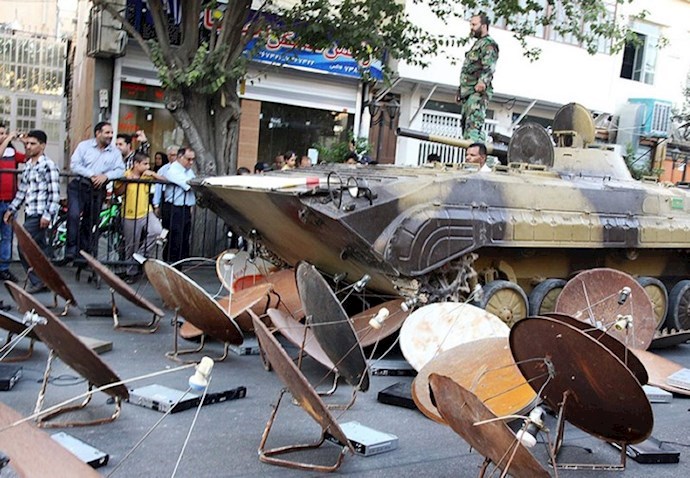Reporting by PMOI/MEK
Iran, November 24, 2020—Nowadays, in Iran under the mullahs’ rule, restricting the internet is the core issue of a long list of prohibitions. The internet is deliberately provided at slow speeds to Iran’s people in comparison to the rest of the world. However, at the same time, this limited internet is at times cut off or disrupted under various pretexts.
And not a day goes by without concerned remarks from the regime’s authorities, the Revolutionary Guards (IRGC) or the paramilitary Basij, expressing concerns about internet "freedoms," though their seemingly "cultural" concerns immediately turn into "security" concerns. Hence, these concerns push the members of regime’s Majlis (parliament) into establishing laws, regulations and rules to suppress any freedom of information.
Looking back, we can find similar example of such concerns in the mullahs’ history. The banning of VCRs in 1980s was a clear example in which finally and inevitably the mullahs officially conceded defeat this regard in the summer of 1993. This resulted in ending punitive measures such as arresting and imposing fines for having VCRs or video cassette. That was not due to the fact that the mullahs were taught a lesson, but because of the emergence of an even graver concern: satellite TV channels.
Satellite TV programs covered the “unspoken issues” that the theocratic regime had tried to cover up for years, via their disinformation campaigns and lies using state media and television to the Iranian public.
Therefore, the regime waged a war against satellite TV in an effort to ban these networks. As a result, on September 20, 1994, the Majlis ratified a bill banning the use of satellite TVs. According to the law, any kind of "importing, transferring, maintaining, distributing, operating, installing and repairing" satellite TV dishes were considered a "crime" and punishable by fines, flogging and imprisonment.
Ultimately, of course, the war between the regime and satellite dishes achieved nothing but a disgraceful defeat for the mullahs’ regime. In fact, not only the urbanites, but even Iranian villagers—who detest the regime and are fed up with state TV networks spreading propaganda and disinformation—started to install all kinds of satellite dishes on the roofs of their houses, challenging the regime’s oppressive policies.
Regime officials have repeatedly acknowledged that such oppressive policies are just futile efforts that harass the public for a short while. A former minister said that more than 70 percent of the Iranian people use satellites dishes paying no heed to the regime’s rules.
While the preceding “war” between the mullahs and satellite dishes was not over, the regime is now scourged by the Internet. It goes without saying that, if those fines, floggings and imprisonments failed to stop people from utilizing VCRs and satellite channels, internet filtering will also fail to block the internet.
This raises a question: Why is the regime Supreme Leader Ali Khamenei so concerned about such issues? Why does he resort to a double-edged policy while knowing the end result will be Iran’s people detesting him and his regime more than ever before? And on the other hand, he is not even capable of finalizing his intended measures?
To answer these questions, one must pay close attention to the nature of the reactionary rulers of Iran.
This is a matter of life and death for the mullahs as knowledge and freedom of information bursts their bubble of permanent rule in Iran.
Basically, the religious fanatics are incongruous with new phenomenon, as they consider them a threat to their existence and reactionary mentality.
When such reactionaries also reach the levers of "government," they are always concerned of this knowledge spreading. They are fully aware that knowledge is capable of destroying their entire apparatus and would prove their invalidity. That is why they seek to muffle any opposing voice spreading knowledge.
There have been examples of this oppressive logic before in history. However, what the Iranian people are experiencing right now is the most brutal and oppressive version.
With regime founder Ruhollah seizing power in Iran back in 1979, a new kind of dictatorship and religious fascism emerged as a government based on the absolute power of clerics’ rule (Velayate-Faghih) aimed at dominating the people of Iran. Submitting to the smallest gap in this dominance would give way to a series of retreats for the regime, which in turn means the beginning of the end for Iran’s regime.
The bubble of a totalitarian establishment based on "lies", "hypocrisy" and "repression" must always be protected in every way with the most extreme and barbaric methods. This is the clear interpretation of Khamenei’s words saying the regime’s first retreat would lead to a chain of setbacks that would eventually result in its disintegration.
Of course, failure of the regime to impose these oppressive restrictions indicate the Iranian people’s strength and determination who have stood against the mullahs’ repressive ambitions. This is a fact that regime authorities and state media have explicitly acknowledged.
"Regarding the internet, do not let us experience and incur the crushing defeats over the bans set on VCRs and satellite dishes,” the state-run Shargh daily wrote on November 5.
“Following 26 years of prohibiting the use of satellite TV equipment, the Majlis should learn a lesson from such failures and not legislate laws to filter social media networks as people would find ways to circumvent the censors,” the piece adds.





